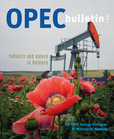Iran accuses Saudi Arabia of breaking OPEC ceiling
By BENOIT FAUCON
ISTANBUL -- Iran on Thursday accused Saudi Arabia of breaching a collective OPEC agreement, reviving fears that the producer group could fracture again when it meets in June.
Iran, along with its key ally Venezuela, has been escalating rhetoric against OPEC members like Saudi Arabia that have ramped up production in order to replace output from sanctions-hit Iran.
That has raised fears that acrimony could return within OPEC after Saudi Arabia and Iran - the group's two largest producers - clashed at a gathering last year, bringing the meeting to collapse.
 Any new split within the group - which is set debate output again mid-June - could impede its ability to both coordinate production and to keep a lid on oil-price volatility.
Any new split within the group - which is set debate output again mid-June - could impede its ability to both coordinate production and to keep a lid on oil-price volatility.
Iran's Oil Minister Rostam Ghasemi said OPEC "should produce up to 30 million barrels per day [as a group], but some countries including Saudi Arabia don't observe these regulations."
In December, OPEC - whose members produce over one in three barrels consumed in the world each day - agreed to the collective ceiling of 30 million bpd in December.
But the deal appears to have been still born. According to its own statistics, the group's daily production is now higher by 2 million bpd, largely driven by a Saudi move to replace Iranian oil.
Ghasemi warned Iran was entitled to protest against overproduction by another member in the group.
A Gulf OPEC official said the Saudis weren't aware of any complaint to OPEC and are producing what their customers need.
But Venezuelan Oil Minister Rafael Ramirez on Tuesday said OPEC is over-producing and flooding the market with oil.
The verbal attack on Saudi Arabia comes as Iran is facing uphill challenges to sell its oil because of sanctions against its nuclear program.
 New international measures against its banking sector have impeded its oil sales even before a full European ban on its oil starts this summer.
New international measures against its banking sector have impeded its oil sales even before a full European ban on its oil starts this summer.
According to consultancy Petro-Logistics, sanctions imposed on Iran by the West have already led to a 14% drop in the country's exports.
Ghasemi on Thursday denied the decline but he admitted that Greek refiners and UK major Royal Dutch Shell were having problems paying for Iran oil.
A spokesman for Shell - which Iran says has stopped getting its oil due to the banking issue - declined to comment.
To dampen oil prices driven by Iran supply fears, Saudi Arabia - the world's largest oil exporter - has hiked production to 10 million bpd, its highest level in three decades.
As a result, more than two years of steadily tightening oil-market conditions have reversed, the International Energy Agency, which represents the interests of major energy-consuming rich countries, said last week.
Brent crude, the most widely used oil-futures benchmark globally, has fallen by $10 to about $118/bbl in about six weeks.
Yet the Saudi boost could also exacerbate tensions that have been slowly creeping back behind the drawn curtains of OPEC's officialdom.
With Iran threatening to close the strategic Strait of Hormuz to retaliate against sanctions, Gulf nations from Qatar to Iraq have started beefing up security measures and looking at possible alternative routes.
A private ceremony at the grandiose palace of the Amir of Kuwait on the side of an energy conference last month gave a taste of the atmosphere that might prevail at the next OPEC meeting.
Standing in the same room under the giant crystal candlesticks and imposing columns, Ghasemi and Saudi Oil Minister Ali al-Naimi ignored each other.
This was in contrast with the December OPEC gathering, where they held a cordial bilateral meeting.
But experts say the current tension underscores a growing threat to the group's relevance.
OPEC members "don't trust each other," said Dale Nijoka, global oil sector leader at consultancy Ernst & Young. As a result, "they aren't as effective as they once were. Everyone has their own agenda."
Dow Jones Newswires






Comments